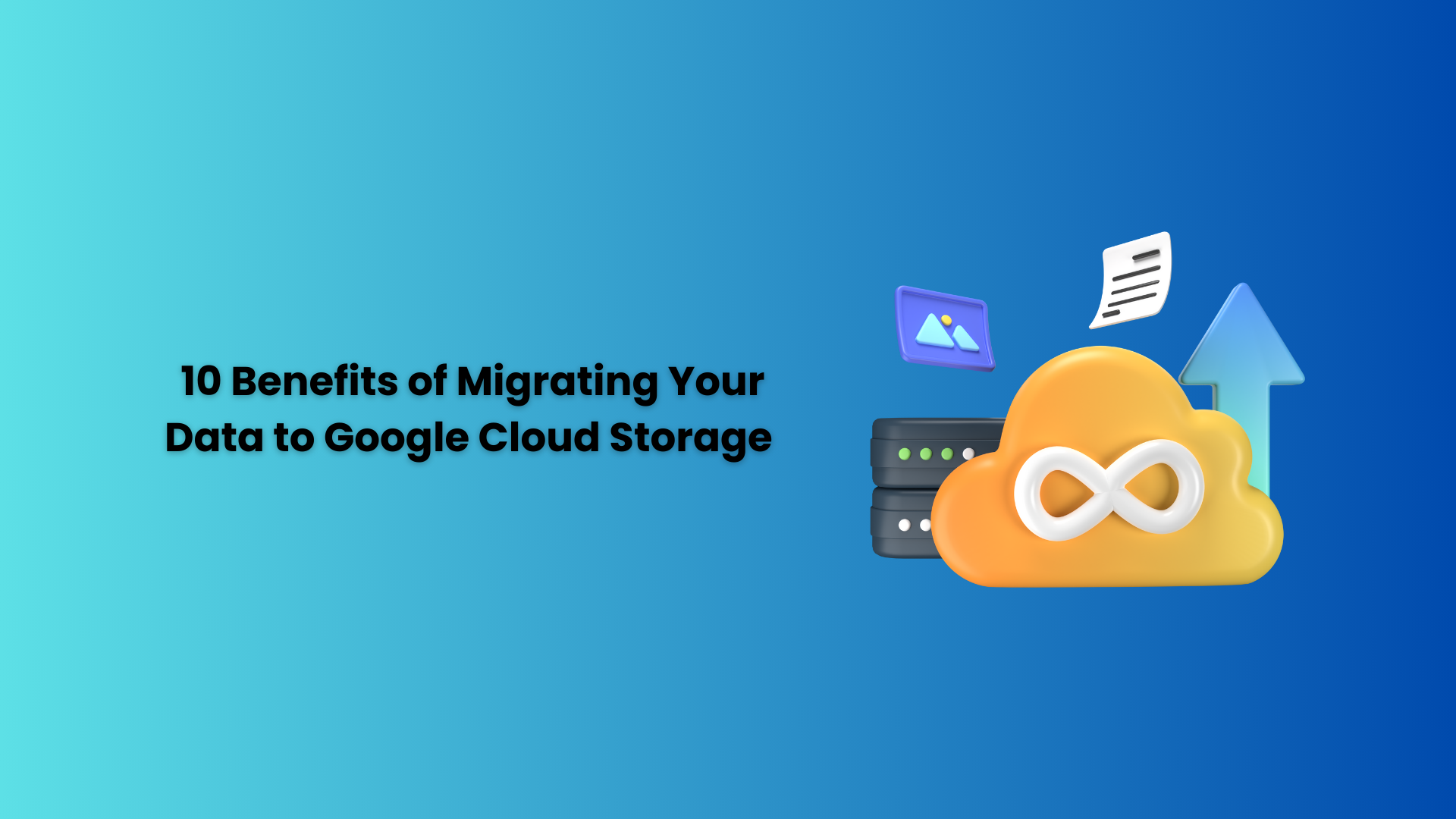Transferring your data to Google Cloud Storage can be a wise decision, regardless of whether you’re trying to optimiseoperations in a small firm or want to leverage cloud technology in a large enterprise. In this blog, we’ll look at ten advantages of moving your data to Google Cloud Storage. You’ll learn why Google Cloud Certification is a compelling option whether you’re experienced with cloud solutions or are just getting started with this game-changing technology.
Table of Content
• Scalability
• Flexibility
• Cost Savings
• Data Security
• Advanced Analytics and Machine Learning
• Accessibility and Collaboration
• Disaster Recovery and Business Continuity
• Data Redundancy and Reliability
• Integration with Google Services
• Global Reach
• Conclusion
1. Scalability
Google Cloud Storage is adaptable to meet your changing needs, whether you’re a startup or a business managing massive volumes of data. This solution can easily increase or decrease your storage capacity in response to demand, saving you money by doing away with the hassles of having too little storage or having to deal with overprovisioning. Large datasets are just one benefit of scalability; another is that they foster innovation by supplying resources when needed.
2. Flexibility
Costs can be reduced by categorising your data, keeping often requested data in high-performance storage, and archiving less frequently used data in less expensive choices. This dynamic flexibility ensures that you are increasing your storage and doing so smartly, optimising costs while ensuring data accessibility.
3. Cost Savings
With a pay-as-you-go pricing strategy, you only pay for the storage you utilise, offering scalability and cost-effectiveness. Features such as data lifecycle management and predictable budgeting aid in cost reduction. Furthermore, lower downtime risk corresponds to reduced financial losses. Google Cloud Storage enables businesses to redirect resources towards innovation and growth, making data management smarter, leaner, and more agile, resulting in significant cost savings.
4. Data Security
Protecting your data from unauthorised access is made possible by features like encryption both in transit and at rest. Google offers unmatched safety thanks to its top-notch security infrastructure, which is reinforced by ongoing monitoring and sophisticated threat detection. Thanks to identity management systems and access controls, you have fine-grained control over who can access your data. Moreover, Google Cloud Storage’s dedication to maintaining strict security standards is confirmed by compliance certifications like ISO 27001 and SOC 2.
5. Data Redundancy and Reliability
Ensuring the security and accessibility of your valuable data is a crucial aspect of data management. When you migrate your data to Google Cloud Storage, it is automatically distributed across multiple data centres that are geographically separated. This is done to ensure optimal security for your data. This indicates that your data remains accessible and undamaged, even if there are hardware malfunctions or unexpected disruptions.
6. Accessibility and Collaboration
By transferring your data to Google Cloud Storage, you will have the ability to access and collaborate with individuals from all around the world. Google Cloud’s infrastructure enables a collaborative work environment by allowing you and your team to access data from anywhere with an internet connection. Collaboration on projects, file sharing, and real-time updates are possible from any location. The potential benefits of this level of accessibility include increased productivity and optimisedworkflows for your company.
7. Advanced Analytics and Machine Learning
There are two main benefits of using Google’s cloud storage platform. The first is cloud storage, which offers a safe place for consumers to keep their information. The second useful function is the capacity for analysis and the extraction of insights from the collected data. Once you have your data stored in Google Cloud, you can take advantage of numerous robust tools for sophisticated analytics and machine learning.
Google Cloud’s analytic and machine learning features are state-of-the-art and unrivalled in the business world. BigQuery is a robust platform for performing rapid analysis on massive datasets. BigQuery allows you to analyse your data and draw conclusions about it’s structure, behaviour, and significance. With this knowledge, one can make educated choices. Using your data as input, machine learning models may be taught to carry out predictive analytics and automate otherwise labor-intensive processes.
8. Disaster Recovery and Business Continuity
Migrating your data to Google Cloud Storage offers robust disaster recovery and business continuity solutions, which are highly advantageous. Your data remains secure and accessible, even in the event of unexpected disruptions like natural disasters, hardware issues, or cyberattacks.
Google’s data centres are strategically positioned in various locations around the world to ensure that data redundancy and availability are maintained even in the event of unforeseen challenges. Google Cloud Storage provides a range of features that help businesses maintain smooth operations. These include automatic backups, failover options, and efficient data recovery capabilities.
9. Integration with Google Services
Google Cloud Storage is designed to work seamlessly with various Google services and products. This integration enhances the functionality of data storage and creates new possibilities for users.
1. Google Workspace Integration
Google Workspace is a powerful tool that allows users to collaborate seamlessly on documents, spreadsheets, and presentations. By leveraging the capabilities of Google Cloud Storage, it enhances teamwork and productivity.
2. AI and Machine Learning
Google Cloud offers a range of AI and machine learning capabilities, such as image recognition and natural language processing, that can help you extract valuable insights from your data.
3. BigQuery for Data Analysis
You can quickly examine your data with BigQuery, Google’s potent data analytics engine. You can utilise it to make data-driven decisions and acquire insightful knowledge.
10. Global Reach
Migrating your files to Google Cloud Storage opens a whole new world of possibilities. The structure of Google Cloud covers the globe, with data centres strategically positioned in various countries worldwide. This worldwide reach has various advantages:
1. Reduced Latency
Hosting your data closer to your users may drastically reduce latency, resulting in faster information access and better user experiences.
2. Compliance and data Residency
The worldwide footprint of Google Cloud enables you to comply with regional data residency rules, ensuring that your data remains inside certain geographic borders when necessary.
3. Disaster Recovery
Because data centres are distributed, disaster recovery capabilities are strengthened. In the event of a data centre outage, your data is moved to another location smoothly, minimising downtime and data loss.
Conclusion
We’ve discussed the top 10 benefits of data migration to Google Cloud Storage, and it’s clear that making this move will help you stay ahead of the digital curve and create new opportunities beyond merely storing your data on the cloud. It is about embracing a future in which your data is a powerful instrument that moves your company ahead rather than a burden.




